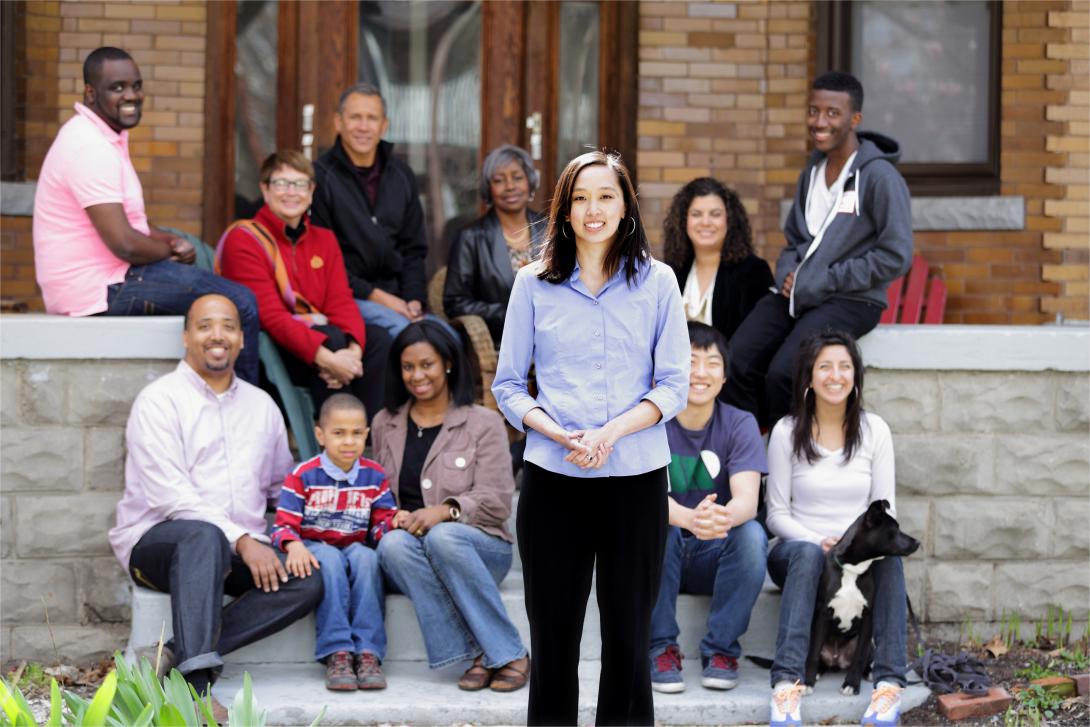December 1, 2014
In November 2014, U-M alumna Stephanie Chang was elected to serve a two-year term in the Michigan House of Representatives, representing District 6 (Detroit along the river, River Rouge, and Ecorse). What makes Chang’s election to office unique is her distinction of being the first Asian American female elected to the Michigan legislature. Chang’s recent accomplishment is preceded by an impressive list of achievements in academia and in her community, all of which utilized her passion for public affairs and social issues.
Chang cites her experiences as a student activist at U-M and within The Program on Intergroup Relations (IGR) as having a large impact on her career and on the development of the skills that led her to her current legislative role. Chang, who was born and raised in Michigan, is a second generation Taiwanese American. While at U-M, she earned an undergraduate degree in psychology and a minor in Asian & Pacific Islander American studies. She then went on to earn dual Masters degrees in Public Policy and Social Work from U-M. During both her undergraduate and graduate studies, Chang devoted a significant portion of her academic career to IGR. In IGR, Chang peer-facilitated two dialogue courses: an intragroup dialogue for women and an intergroup dialogue on gender. She also conducted qualitative research on CommonGround, IGR’s education and training program for students. Chang also made significant contributions to the program as program manager and facilitator for U-M’s Youth Dialogues on Race and Ethnicity in Detroit (a partnership project between IGR and the School of Social Work).
Says Roger Fisher, co-associate director of IGR:
“Stephanie was a student researcher, scholar, community practitioner, and engaged citizen during her time at U-M. We in IGR have had the great privilege of working with her, and admiring her work in all of these roles. Stephanie came to IGR as a student eager to learn skills of dialogic engagement, social justice education and community organizing. Over time, she became a trusted, inspirational and reliable colleague. She clearly demonstrated the deep commitment and vibrant advocacy she now is taking to Lansing as a representative."
In reflecting on her IGR experiences, Chang noted that the program provided an opportunity to engage and develop her passions for social justice, public service and community work. Most appealing to Chang within IGR was her role as peer facilitator in dialogue courses.
“I liked facilitating dialogues and I liked the dynamic of doing so with a co- facilitator from a different identity group. I loved the openness of the student participants and their willingness to share their honest thoughts and experiences with race, gender and other identities.”
Chang went on to say:
“Overall, IGR gave me experience in facilitating groups. In dialogues, I learned how to ask probing questions. The dialogues also gave me a sense of optimism about, and honed my skills in, engaging groups in having meaningful and important conversations. Overall, IGR gave me a knowing that it is possible to bring different groups together in a coalition setting and find common ground on issues. I also learned the importance of bringing all voices to the table.”
During and after completing her U-M education, Chang worked for a decade in Detroit as a community organizer for a number of organizations and progressive causes, addressing issues such as affirmative action, Michigan’s public defense representation system, voting rights, and immigration issues. Her work also included serving as an assistant to Chinese American social justice icon and political activist Grace Lee Boggs.
In her newly elected role as State Representative, Chang has found a strong opportunity to bring the same passion and commitment to community building and social justice that she shared during her academic career. She hopes to also utilize her dialogue facilitation skills and experience to be able to work effectively across the aisle and has bipartisan co-sponsorship for multiple bills she has already introduced. Said Chang:
“In my work, I try to always stay cognizant of identity issues and the dynamics they create. My district looks really different than other districts in Michigan. During my time in IGR, I was able to deeply consider social identity issues in the context of community organizing. I use the skills I gained in IGR and at U-M regularly as I work to advance policy solutions that uphold shared values of equity, fairness, opportunity and access.”

